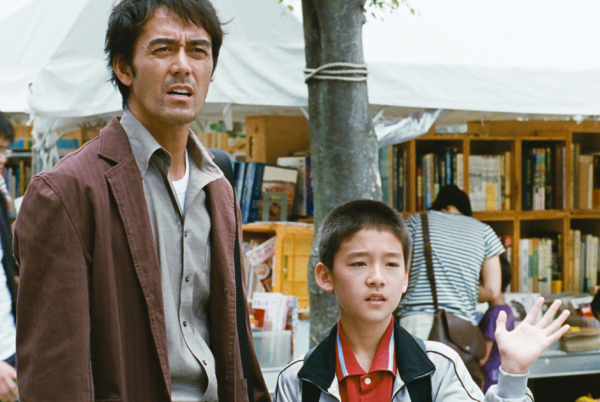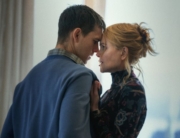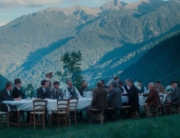My favorite scene in After the Storm takes place near the beginning. It features Yoshiko (Kirin Kiki), the elderly resident of an urban apartment complex, taking a walk with her visiting grown-up son, Ryota (Hiroshi Abe). It’s a beautifully sunny day as they stroll the grounds. Eventually, they run into a neighbor of Yoshiko’s, who has sort-of heard of the book Ryota wrote years ago. From there, mother and son head over to the nearby garbage bins to throw away some cardboard recycling, only to realize that the pick-up is on another day.
Hardly anything that transpires here has any bearing on the rest of the film. But at the same time, it illustrates what is most wonderful about Hirokazu Kore-eda’s latest, which is about the simple pleasures derived from connecting with another human being. Later, it will dip into profound sadness, as the main protagonist finds himself existentially and spiritually lost, but it always returns to the idea of how no matter what, we each have a home in somebody’s heart.
The plot, such as it is, involves Ryota, who worries that he is about to lose his place in the life of his preadolescent son, Shingo (Taiyo Yoshizawa), now that his ex-wife has gotten involved with a new man. Admittedly, Ryota has hardly been a reliable father figure, having failed to pay child support for several months. It isn’t that he doesn’t want to do right; he’s just woefully underequipped emotionally. Rather than set aside money to give to his ex, Kyoko (Yoko Maki), he is more likely to blow whatever he earns at the race track and then scrounge for what he needs at the last minute.
Much of the first half revolves around the scrounging, but it also provides an intriguing character study of a man-child who is adrift and disillusioned. Since his first and only novel failed to sell, Ryota has taken a job as a private detective, which he claims is for research, but it hasn’t yielded anything in the way of new pages or ideas. In the office, he is flanked by co-workers noticeably younger than him, and yet he is easily the laziest and most immature of them all.
As played by Hiroshi Abe, Ryota comes across as a man who is still good-looking and somewhat charismatic, but he has become something of a sad sack, boasting heavy-lidded eyes and a perpetual five o’clock shadow. He tries to live by his wits, but unfortunately, these plans largely blow up in his face. But he has other options: at one point, a manga publisher offers to let Ryota write some comics, but he turns his nose up at the offer. The explanation seems to be that writing is hard work, and hard work is learned behavior. Alas, Ryota modeled too much of himself on his own father, a degenerate gambler who got by through stealing money from Yoshiko, leaving his family in poverty.
The film is very much about the legacies parents pass down to their children, and in the case of Ryota and his sister, that initially seems to be all negative from their paternal side. However, Kore-eda makes a point that it’s more of a mixed bag. Yes, Ryota learned to gamble by watching his father, but why he loves it has entirely to do with a highly-romanticized description of the act, passed down to him by his parent. It only comes to light during a later scene, when he is having his monthly visit with Shingo and decides to buy him lottery tickets. Whatever we think of gambling (and the boy’s mother does not approve of it), there is something genuinely moving about the scene, in no small part because the information also constitutes the only legacy Ryota has to hand down.
The second half takes place almost entirely in Yoshiko’s apartment, as the characters seeks shelter from a long-brewing typhoon. It’s here that some of the best moments of their basic interactions take place, such as the whole family making curry together. There’s also a genuinely heartwarming scene in which Yoshiko gives her ex-daughter-in-law a box containing Shingo’s umbilical cord. Finally, there’s a heart-to-heart that occurs in an abandoned playground slide, which is like the rest of the movie—kind of sad, kind of beautiful.
Kore-eda directs in a manner that emphasizes performance over visual style, and the action seems set to the same casual rhythms as real life. But most importantly, he has empathy for his characters, and that includes the blackest of his black sheep. After the Storm has its share of bittersweet moments, but there is a smile waiting for us at the other side.







Leave A Comment